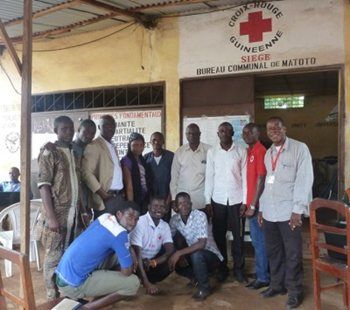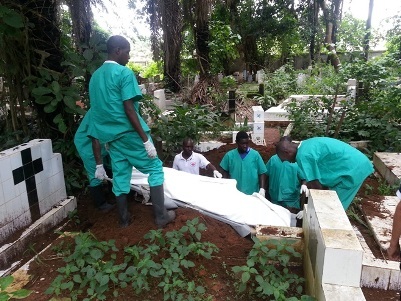Canadian Red Cross communications delegate, Gwen Eamer, has been deployed to support Red Cross relief efforts for Ebola in Guinea. She will be on the ground for three weeks.
Mamadou Saidon Bah wakes up each morning not knowing if he will spend his day grading student assignments and preparing lectures for his work as a teacher, or if he will instead lead a group of young volunteers from the local Red Cross branch on a mission to collect the body of yet another victim of the growing Ebola epidemic.
 Mamadou is the director of the Matoto branch of the Guinean Red Cross, and is on the frontlines of the battle against the epidemic in Conakry, the country’s capital. With Ebola growing exponentially and taking root in urban areas for the first time in history, his team of trained volunteers is only getting busier.
Mamadou is the director of the Matoto branch of the Guinean Red Cross, and is on the frontlines of the battle against the epidemic in Conakry, the country’s capital. With Ebola growing exponentially and taking root in urban areas for the first time in history, his team of trained volunteers is only getting busier.
In a country where the Red Cross handles 97 per cent of all mortal remains, he knows his team has a critical role to play if the epidemic is to be controlled. The bodies of those killed by Ebola are highly infectious, and handling the deceased is one of the primary ways the epidemic is spreading.
“Communities call us to collect the bodies of people who died at home or in the street,” he said, “if we couldn’t or wouldn’t respond I think the epidemic… well, I’d rather not think what would happen.”
 In Matoto, handling dead bodies falls on a group of 15 volunteers, most in their early twenties, led by a local doctor. The team receives ongoing training and personal protective equipment, supported by the IFRC.
In Matoto, handling dead bodies falls on a group of 15 volunteers, most in their early twenties, led by a local doctor. The team receives ongoing training and personal protective equipment, supported by the IFRC.
Mamady Keita has been with the team since the beginning of the outbreak in Conakry.
“Guinea has never known Ebola. I was afraid of being exposed, of contaminating and killing my friends and family because of the work I do,” he said. “But the Red Cross is a family, and we have rallied together with training and equipment for protection. I can use this to help my community.” Pausing, he added, “We’re here, we’re trained, we have to help. Even though our families are afraid, we can’t quit, we just can’t.”
“When we’re not burying bodies, we work in our communities to change behaviours and teach our families and neighbours how to avoid infection,” added teammate Fatoumata Sylla. As a lifelong resident of Matoto, community members trust her to share accurate information from the Red Cross. “Sometimes it’s hard,” she admitted, “but if we give up and go home, everything is lost.”
Red Cross volunteer teams in Guinea have safely buried the bodies of nearly 400 people killed by Ebola virus disease since the epidemic began in March. Volunteers have also reached more than 630,000 people through door-to-door outreach efforts, and more than 1.2 million through mass public education campaigns.
Canadians can support Red Cross efforts by donating to the West Africa Ebola Fund.